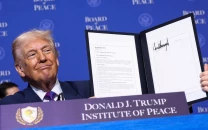You can be fined $545,000 for using a VPN in UAE
UAE has introduced a federal law banning the use of VPNs to try to avoid paying for expensive VOIP services

UAE President Sheikh Khalifa bin Zayed Al Nahyan (right) has issued new federal laws banning the use of VPNs in the country. PHOTO: REUTERS
According to the new law, VPN or proxy server users can be imprisoned and fined between $136,000 to $545,000 if they are found using VPNs fraudently.
45,000 people sign petition to end Netflix’s VPN crackdown in Pakistan
Previously, the law was restricted to prosecuting people who used VPNs as part of an internet crime, but UK-based VPN and privacy advocate Private Internet Access says the law has now changed to enable police in the UAE to go after anyone who uses VPNs to access blocked services, which is considered a fraudulent use of an IP address.
VPNs are useful for online privacy as they allow users to change their location by connecting to a private network on the Internet.
However, they can also be used to circumvent region restrictions on content such as tricking Netflix US into thinking that foreign users are based in that country, or bypassing state censorship in China or Turkey to access services like Twitter and Facebook or even pornographic websites. VPNs are also often used in conjunction with the Tor anonymity network to access websites hidden on the Dark Web.
Pakistan keeps mum on $800m owed by UAE's Etisalat
At the moment, a large number of people residing in the UAE utilise VPNs in order to access popular apps that are inaccessible from within the Gulf nation likes WhatsApp, Snapchat and Viber, which are messaging and voice apps that make use of Voice over IP (VoIP) technology to deliver voice calls over the internet for free.
VoIP "over-the-top" apps have long been a problem for telecoms operators around the world, because consumers no longer need to pay international calling rates to speak to their loved ones – they can just speak to them on Skype, WhatsApp, Facebook Messenger, Viber or Snapchat.
The law makes UAE’s government the first in the world to regulate on behalf of and for its telecoms companies in order to help them stem loss of revenue from VoIP apps.
Dubai to build tower taller than Burj Khalifa
Etisalat and du are the only two companies in the world that have been granted licences by the UAE government to offer commercial VoIP services, which can be expensive.
The move will stop citizens from choosing what services they wish to use. Experts have criticised the UAE, Etisalat and du in the past for seeking to block voice calling features in Snapchat, Skype and Whatsapp from working in the UAE. However, UAE's telecoms regulator stands by the Etisalat and du, and also says that the apps should be banned due to security concerns.
This article originally appeared on IBT.



















COMMENTS
Comments are moderated and generally will be posted if they are on-topic and not abusive.
For more information, please see our Comments FAQ